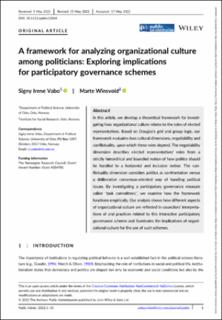A framework for analyzing organizational culture among politicians: Exploring implications for participatory governance schemes
Peer reviewed, Journal article
Published version
Date
2022Metadata
Show full item recordCollections
- Publikasjoner fra CRIStin [715]
- Tidsskriftpublikasjon [388]
Abstract
In this article, we develop a theoretical framework for investigating how organizational culture relates to the roles of elected representatives. Based on Douglas's grid and group logic, our framework evaluates two cultural dimensions, negotiability and conflictuality, upon which these roles depend. The negotiability dimension describes elected representatives' roles from a strictly hierarchical and bounded notion of how politics should be handled to a horizontal and inclusive notion. The conflictuality dimension considers politics as confrontation versus a deliberative consensus-oriented way of handling political issues. By investigating a participatory governance measure called “task committees”, we examine how the framework functions empirically. Our analysis shows how different aspects of organizational culture are reflected in councilors' interpretations of and practices related to this interactive participatory governance scheme and illuminates the implications of organizational culture for the use of such schemes. A framework for analyzing organizational culture among politicians: Exploring implications for participatory governance schemes
